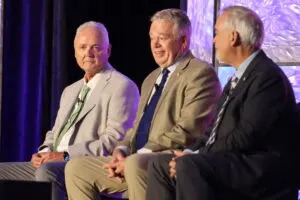North Dakota Gov. Kelly Armstrong, center, talks Sept. 17, 2025, during the North Dakota Petroleum Council annual meeting in Watford City. At left is Petroleum Council President Ron Ness and at right is Clay Gaspar of Devon Energy. (Photo by Jacob Orledge/North Dakota Monitor)
WATFORD CITY, N.D. – North Dakota oil and gas companies have new economic allies in the form of a tech industry “desperate” to find energy sources to fuel the growth of artificial intelligence, Gov. Kelly Armstrong said Wednesday.
The governor, asked during the North Dakota Petroleum Council’s annual meeting about the value of artificial intelligence to the state, said “it is changing the dynamic” in a way that isn’t often discussed.
The demand for artificial intelligence, generated in energy-intensive data centers, is surging from technology giants and countries around the globe. That is turning employees of tech companies, whom Armstrong called the “traditional adversaries” of places like North Dakota, into customers for natural gas.
“People who hated natural gas not that long ago, like 36 months ago, have all of a sudden recognized that natural gas is the key to the survival of their company,” Armstrong said.
That demand for power generation aligns with North Dakota’s need to find markets for its natural gas, a byproduct of crude oil production.
“We’re going to see new synergies,” Armstrong said, “between Silicon Valley tech companies and western North Dakota oil companies.”
Artificial intelligence companies may be the exact consumers North Dakota has been looking for to take care of the state’s excess supply of natural gas. WBI Energy is developing a natural gas pipeline from northwest North Dakota to the eastern part of the state with the help of an up to $500 million financial backstop awarded by the state. WBI said in application materials for the funding that some potential customers for the natural gas are developing power generation to support data centers.
North Dakota is an attractive place for data centers because the climate allows companies to lower their cooling costs.
“Being cold and windy is not usually a selling point,” Armstrong said.
Enhanced oil recovery
North Dakota’s oil production, meanwhile, is expected to decline in the upcoming decades. But that’s not because the oil is running out. Oil companies can only extract a fraction of the crude oil underground before the reservoir, the pool of oil, loses pressure and wells become unproductive.
The industry has been testing enhanced oil recovery methods to repressurize the underground reservoirs and continue pumping oil. The next few years will be crucial to advancing the technology, said John Harju of the Energy and Environmental Research Center at the University of North Dakota.
One enhanced oil recovery method involves injecting carbon dioxide underground. But North Dakota doesn’t produce enough carbon dioxide to fill the needs of the oil field. The proposed Summit Carbon Solutions pipeline to bring CO2 from surrounding states has met significant opposition, raising concerns about the industry’s ability to obtain and transport enough CO2 for the Bakken.
Natural gas could serve as a replacement, Harju said.
“We feel very confident that performance with rich gas is going to be an outstanding proxy for CO2,” he said.

Rep. Craig Headland, from left, Sen. Mark Enget and Sen. Brad Bekkedahl participate in a lawmaker panel Sept. 17, 2025, during the North Dakota Petroleum Council annual meeting in Watford City. (Photo by Jacob Orledge/North Dakota Monitor)
North Dakota has seen some opposition to energy-related projects in recent years. Rep. Craig Headland, R-Montpelier, said it is increasingly difficult to obtain easements for pipelines and other infrastructure necessary to continue energy development.
“The public good doesn’t seem to matter like it used to,” Headland said during a lawmaker panel.
Sen. Mark Enget, R-Powers Lake, said he’s had many discussions with North Dakotans concerned about their property rights. Some of the problem, he said, is how companies approach landowners during a project’s development.
“The people I’ve talked to all understand that progress is necessary. They’re not against it,” Enget said. “North Dakota people are very reasonable. If you talk to them respectfully and you work towards a solution and discuss it in a way that resonates and makes sense to them, there’s a way through it.”
Burke County, where Enget is from, has welcomed a recent growth in oil and gas activity, but it has come with challenges, he said. School overcrowding is an issue. Roads and other infrastructure are experiencing wear and tear. And, more recently, he’s grown concerned about the use of water resources for hydraulic fracturing.
“It creates a problem where many of our water resources in the county are really being drawn down,” Enget said. “So I worry about the longer term and if we see more and more activity, where all of that water is going to come from.”
Infrastructure projects, property rights and a way to reconcile the conflicts between them will continue to be an issue in the state, said Sen. Brad Bekkedahl, R-Williston.
“I think it’s going to loom large in the next session,” Bekkedahl said.
North Dakota Monitor reporter Jacob Orledge can be reached at jorledge@northdakotamonitor.com.
SUPPORT: YOU MAKE OUR WORK POSSIBLE
SUBSCRIBE: GET THE MORNING HEADLINES DELIVERED TO YOUR INBOX
